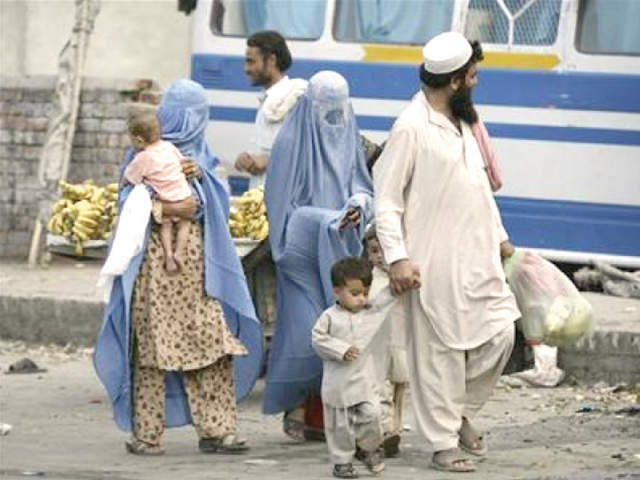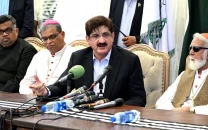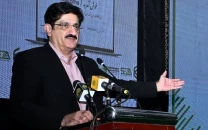The plight of displaced communities
Researchers shed light on the problems in context of anti-encroachment operation, challenges faced by Afghan refugees

PHOTO: FILE
He was invited to the session as a last-minute replacement for Karachi Mayor Wasim Akhtar, and not mincing words, he said that most of the topics that the young researchers from the Habib University and the Institute of Business Administration’s Karachi Urban Lab spoke on “have been studied to death.”
Yet, the fact cannot be ignored that the problems that were highlighted during the session have continued to persist for many years. Summing up these problems, of displaced persons and communities, Professor Severine Minot of Habib University opined that the actual issue pertains to that of “divisions.”
‘Community policing to help eradicate anti-social elements’
“There is a problem of divisions - divisions by class, by ethnicity, by religious and sectarian politics - which hinders the capacity to mobilise [communities],” she said.
Speaking along similar lines, the speakers presented these problems mainly in the context of the recent anti-encroachment operation along the Karachi Circular Railway (KCR) track and the identity crisis faced by Afghan refugees in the city.
Soha Macktoom of the Karachi Urban Lab addressed the issue in terms of social divisions that threaten those living in the fear of being displaced as a consequence of development and infrastructure projects like KCR.
Specifically referring to the KCR, she pointed out the way certain terminologies are used to create divides between those that the government intends to displace and the general public.
“Language is used as a tool to create a certain perception about these settlements and the people who reside there,” she said. “Presently, these people are commonly referred to as “encroachers and illegal” and the settlements as “unauthorised and sums.” She further said, “Such words are then used to justify any violent action against them [and] to create a perception among the public that they are a menace and it is necessary to remove them.”
Macktoom emphasised that in the consequence of a settlement razed to make space for a development project, the displaced people’s losses go way beyond the material loss of a house.
“It is structure of identity, it’s a structure of memory, there are generations living in these houses,” she said, adding that their livelihood and sense of belonging to the city is also affected. “They have to start their life from scratch,” said Macktoom.
Kevin Shi, another researcher at Karachi Urban Lab, building on Macktoom’s arguments and analysed the divide in a historical perspective. He said that about 10 years ago, those who are today referred to as “encroachers” in the city, were considered “project-affected persons”.
“Notice the difference [in both the terms],” he said. “Affected implies a passive act, in which something happens to someone and encroachers implies an active act where one acts out of greed to take something that is not theirs,” added Shi.
He also quoted various examples to support his argument that the government’s negligence and inefficiency towards providing proper accommodation to refugees back in 1960s is one of the reasons behind the persistent problem of displacements and encroachments in Karachi.
Arsam Saleem of Karachi Urban Lab presented a political aspect of the view, discussing divisions within the displaced communities when it comes to resistance politics. He outlined three strategies of resistance used by the displaced communities.
“The displaced persons approach influential people such as politicians to seek their help, or they stage protests and demonstrations or file legal pleas,” he said.
Differences among various groups along the lines of resistance politics hampers a community’s mobilisation, reflected Saleem, adding that lack of solidarity is a hurdle in the resolution of problems of the displaced communities.
Another researcher from Karachi Urban Lab, Fizza Qureshi, talked about the predicament of displaced persons in terms of gender disparities.
“Men and women essentially navigate and experience the city differently she said, as she highlighted how women are at a greater disadvantage in the aftermath of displacement. In most informal ‘encroached settlements’, women have easier access to marketplaces and other places, as these are located nearby their residence, she said, adding that in case of displacement they would have to rely on public transport which makes the access difficult for them.
Transgender community: Lahore embraces its pariahs
Qureshi also highlighted that in case of resistance movements, women are kept out of the loop and have little say in the decision-making process, whereas, they are ironically encourage to partake in protest so as that the demonstration appears more convincing.
Beside these problems, challenges particularly faced by Afghan refugees were also discussed during the session, as Zahra Batool and Shahmir Faisal of Habib University presented their research. They mainly spoke about the financial and class differences that have risen out of the Afghan refugees’ lack of access to education and employment opportunities. They shed light on the plight of the disadvantaged that continued to be challenged by an identity crisis - particularly second-generation refugees - having no documents to legitimise their residence in the country.
Published in The Express Tribune, November 4th, 2019.



















COMMENTS
Comments are moderated and generally will be posted if they are on-topic and not abusive.
For more information, please see our Comments FAQ